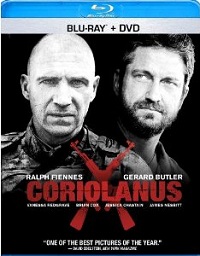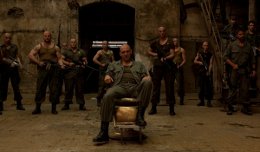 For his directorial debut Ralph Fiennes chooses a modern adaptation of William Shakespeare‘s Coriolanus. To help, Fiennes enlisted the help of screenwriter John Logan (Hugo, The Last Samuari, Sweeney Todd, Rango, Gladiator). It’s an ambitious project to be sure but despite some solid performances the film hits some snags when adapting the story to modern day.
For his directorial debut Ralph Fiennes chooses a modern adaptation of William Shakespeare‘s Coriolanus. To help, Fiennes enlisted the help of screenwriter John Logan (Hugo, The Last Samuari, Sweeney Todd, Rango, Gladiator). It’s an ambitious project to be sure but despite some solid performances the film hits some snags when adapting the story to modern day.
Fiennes stars as Caius Marcius Coriolanus, a legendary general of Rome who cares little for politics, and far less for the troubles of the common man. Despite his disinterest he agrees to run for the Senate to please his mother (Vanessa Redgrave). This action, far more than any risk ever taken on the battlefield, will prove to be his undoing.
Despite his military victories Coriolanus’ arrogance and scornful view of commoners is used against him by a pair of Senators (Paul Jesson, James Nesbitt) to turn the populace against the war hero and expel him from Rome. In the most egregious example of how the plot isn’t adapted to mirror how the world works today, the displeasure of the rabble (as Coriolanus sees them) at a single gathering forces his expulsion of the general from Roman society. Exactly how this is accomplished isn’t well explained.
 Having nowhere else to go our hero joins his greatest enemy, the leader (Gerard Butler) of the Volscian army, whose attempts to sack Rome Coriolanus has stopped repeatedly. Unable to serve his country any longer, Coriolanus weilds his hate like a weapon and aims it squarely at Rome.
Having nowhere else to go our hero joins his greatest enemy, the leader (Gerard Butler) of the Volscian army, whose attempts to sack Rome Coriolanus has stopped repeatedly. Unable to serve his country any longer, Coriolanus weilds his hate like a weapon and aims it squarely at Rome.
Fiennes and Butler work well as opposing military leaders who find a common enemy in Rome. Their relationship, and how it evolves over the course of the story works far better than the plotting underhanded Senators (whose motives could be better explained). The message of how easily a crowd can be swayed by a little marketing and the right words at the right time feels all too true in our current culture. However, given that the movie takes place in a world with 24-hour news and the Internet I’m a bit surprised these weren’t used more to drive the point home.
 For the most part, the film does a good job at incorporating modern technology and merging it with Shakespeare’s tale. Although they’re both armed to the teeth the idea that Fiennes and Butler’s characters would drop everything for a knife fight isn’t as eye-rolling as you might assume (hey, it worked for Steven Seagal), but there are places where media outlets, cellphones, and the Internet could have been brought more into the story. I can understand the choice to try and stick close to Shakespeare’s original tale but, then again, this is a film with tanks, machine guns, and modern guerrilla warfare.
For the most part, the film does a good job at incorporating modern technology and merging it with Shakespeare’s tale. Although they’re both armed to the teeth the idea that Fiennes and Butler’s characters would drop everything for a knife fight isn’t as eye-rolling as you might assume (hey, it worked for Steven Seagal), but there are places where media outlets, cellphones, and the Internet could have been brought more into the story. I can understand the choice to try and stick close to Shakespeare’s original tale but, then again, this is a film with tanks, machine guns, and modern guerrilla warfare.
Rome throws out its greatest military mind only to find him leading her enemies down her throat. The play, and movie, certainly enjoys its sense of irony as well as a common theme of Shakespeare in the tragedy of great men taken down by the pettiness of smaller men who are threatened by what the heroes represent, or what they might do given even greater power and authority.
As Fiennes first time behind the camera, it’s a mixed success but it works more often than not. Coriolanus has a grittiness that fits its tale, although at two hours, there are some sequences or series of events that feel rushed.
Shakespeare’s dialogue isn’t successful in every scene, but it does work best when the actors play up the drama inherent in the plot. It’s certainly not for everyone, but for those in the mood for Shakespeare as action-tragedy this may be the film for you.







Comments on this entry are closed.